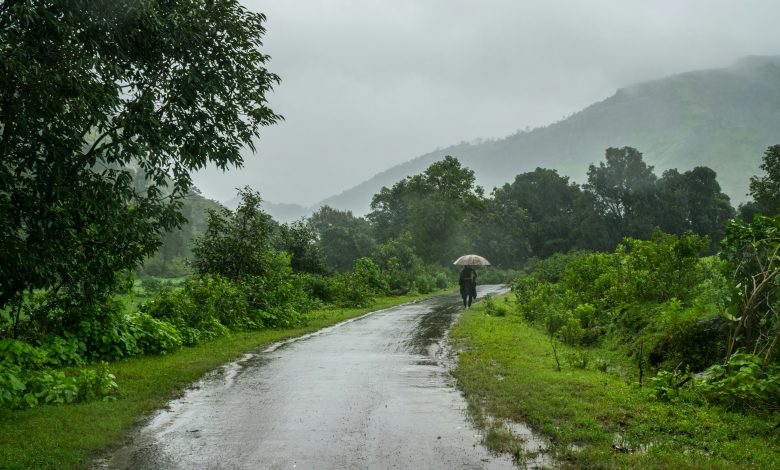Embracing the Monsoon: 12 Simple Strategies for Staying Healthy

As the monsoon season sets in, it brings relief from the scorching heat and a refreshing change in the environment. However, amidst the joy of rain showers and the earthy scent of petrichor, there lies a lurking concern for potential health hazards that accompany the rains.
The monsoon season creates an ideal breeding ground for various health risks, including waterlogging, mosquito proliferation, and frequent power outages. Moreover, the high moisture levels foster the growth and spread of bacteria, viruses, and fungi, leading to a plethora of ailments ranging from common colds to serious diseases like typhoid and dengue fever.
Here are 12 practical yet effective tips to safeguard your health during the monsoon season, allowing you to revel in the beauty of the rains without compromising your well-being.
- Stay Hydrated:
Despite the cool weather, it’s crucial to stay hydrated during the monsoon season. Increased humidity and sudden temperature drops can lead to dehydration, weakening the immune system. Aim to drink at least eight to ten glasses of water per day, and include hydrating beverages like herbal teas, fresh fruit juices, and coconut water to maintain optimal hydration levels. - Prioritize Personal Hygiene:
Maintaining impeccable personal hygiene is essential to prevent illnesses during the monsoon season. Moist and humid conditions create favorable environments for bacteria and fungi to thrive, increasing the risk of infections. Regular handwashing with soap and water, along with daily showers and proper storage of clothing, helps mitigate the spread of germs and reduces the likelihood of skin ailments. - Avoid Stagnant Water:
Standing water serves as a breeding ground for mosquitoes, which can transmit diseases such as dengue, malaria, and chikungunya. Be vigilant and avoid areas with stagnant water, and ensure that containers like buckets and flowerpots are emptied or removed to prevent mosquito breeding. - Dress Appropriately:
Wearing long-sleeved shirts and trousers provides protection against mosquito bites and minimizes skin exposure to rainwater and pollutants. This reduces the risk of mosquito-borne illnesses and skin infections, common during the monsoon season. - Use Mosquito Repellents:
With increased mosquito activity during the monsoon, using mosquito repellents becomes essential to prevent disease transmission. Apply repellents to exposed skin and clothing before venturing outdoors or retiring for the night to ensure long-lasting protection against mosquito bites. - Opt for Well-Cooked Meals:
Consuming clean, well-cooked meals is crucial during the monsoon season to avoid foodborne illnesses. The humid weather fosters bacterial growth, increasing the risk of digestive tract infections. Ensure that meat and seafood are cooked thoroughly, and practice good food hygiene by washing produce before consumption. - Boost Your Immunity:
Strengthening the immune system is vital to ward off infections prevalent during the monsoon season. Consume a balanced diet rich in antioxidants, vitamins, and minerals to support immune function. Adequate sleep, stress management, regular exercise, and considering immunizations or immune-boosting supplements further enhance immunity. - Stay Active:
Despite the rainy weather, maintaining an active lifestyle is crucial for overall health during the monsoon season. Incorporate indoor exercises such as yoga, stretching, or home workouts to stay physically and emotionally resilient. Regular exercise boosts immunity, improves circulation, elevates mood, and aids in stress management. - Get Vaccinated:
Vaccination is an effective preventive measure against infectious diseases that surge during the monsoon season. Consult healthcare professionals for timely vaccinations against flu, typhoid, and hepatitis A to bolster immunity and minimize disease risk. - Maintain Clean Living Spaces:
Regular cleaning and disinfection of living spaces are essential to prevent the spread of infections and ensure a healthy environment. Dampness and humidity during the monsoon season can promote mold and germ growth, leading to respiratory issues. Fix leaks, keep living spaces well-ventilated, and maintain cleanliness to mitigate health risks. - Avoid Contaminated Food and Water:
Steer clear of street food and untreated water to prevent food and waterborne illnesses. High temperatures and humidity increase the likelihood of food contamination, posing health risks. Consume freshly cooked meals from hygienic sources and opt for boiled, filtered, or treated water to minimize the risk of infections. - Seek Prompt Medical Attention:
Be vigilant for symptoms of illness and seek medical attention promptly if necessary. Early detection and treatment can prevent complications associated with monsoon-related diseases. Consult healthcare professionals for accurate diagnosis and timely intervention to safeguard health during the rainy season.
In conclusion, while the monsoon season brings relief from the sweltering heat, it also poses health hazards that require vigilance and proactive measures. By following these 12 simple strategies, you can enjoy the monsoon’s splendor while prioritizing your health and well-being. Let’s embrace the rains responsibly and make this season a memorable and healthy one!


